Linux Netbooks and Mini-notebooks
Jul 28, 2001 — by Eric Brown — from the LinuxDevices Archive — 781 views“Netbooks” are small, low-cost, power-efficient mini-notebook computers, often based on low-power Intel processors, such as the Atom. Since Asus achieved the first mainstream netbook success with its Linux-based Eee PC, netbooks have gone on to become one of the best-selling categories in all of computing. Most of these netbooks are also available in Windows XP versions, and other Windows-based netbooks may be found in the Windows Netbook Showcase at our sister site, WindowsForDevices. For a list of Linux-compatible netbooks, read on!
 Dell Inspiron Mini 10 — Dec. 21, 2009 — Dell's second-generation, “2010” version of its Ubuntu-ready Inspiron Mini 10 netbook switches to Intel's Atom N450 processor and offers an optional Broadcom “Crystal HD” media accelerator. The Mini 10 sports a redesigned keyboard, optional HD video support, and up to 9.5 hours of battery life.
Dell Inspiron Mini 10 — Dec. 21, 2009 — Dell's second-generation, “2010” version of its Ubuntu-ready Inspiron Mini 10 netbook switches to Intel's Atom N450 processor and offers an optional Broadcom “Crystal HD” media accelerator. The Mini 10 sports a redesigned keyboard, optional HD video support, and up to 9.5 hours of battery life.
 Cherrypal Africa — Dec. 15, 2009 — Cherrypal's latest netbook is billed as the “world's first $99 laptop.” The “Africa” has a seven-inch display and runs Linux on a 400MHz processor.
Cherrypal Africa — Dec. 15, 2009 — Cherrypal's latest netbook is billed as the “world's first $99 laptop.” The “Africa” has a seven-inch display and runs Linux on a 400MHz processor.
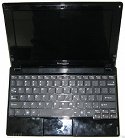 Lenovo IdeaPad FL5-B3 — Nov. 16, 2009 — The Lenovo IdeaPad “FL5-B3” includes a 1.66GHz Intel Atom D450 CPU. The netbook sports a 10.1-inch display, 2GB of RAM, and a 250GB hard disk drive.
Lenovo IdeaPad FL5-B3 — Nov. 16, 2009 — The Lenovo IdeaPad “FL5-B3” includes a 1.66GHz Intel Atom D450 CPU. The netbook sports a 10.1-inch display, 2GB of RAM, and a 250GB hard disk drive.
 Menq EasyPC E790 — Nov. 13, 2009 — China-based Menq's smartbook/mini-netbook costs as little as $80, and though it ships with Windows CE, can also run Android. The Menq EasyPC E790 runs on an ARM9-based Samsung S3C2450 processor, and offers WiFi, Ethernet, SD storage, and a 7-inch 800 x 480 display.
Menq EasyPC E790 — Nov. 13, 2009 — China-based Menq's smartbook/mini-netbook costs as little as $80, and though it ships with Windows CE, can also run Android. The Menq EasyPC E790 runs on an ARM9-based Samsung S3C2450 processor, and offers WiFi, Ethernet, SD storage, and a 7-inch 800 x 480 display.
 Acer Aspire One AOD250-1613 — Oct. 14, 2009 — Acer's first Android-powered netbook is designed as a dual-boot system in which Android handles 18-second boot-ups, enabling users to seamlessly switch between Android and Windows. Acer's Aspire One AOD250-1613 netbook runs on an Intel Atom N280, and offers a 10.1-inch WSVGA display, gesture-enabled touchpad, a multi-card memory reader, and a 160GB SATA hard disk drive.
Acer Aspire One AOD250-1613 — Oct. 14, 2009 — Acer's first Android-powered netbook is designed as a dual-boot system in which Android handles 18-second boot-ups, enabling users to seamlessly switch between Android and Windows. Acer's Aspire One AOD250-1613 netbook runs on an Intel Atom N280, and offers a 10.1-inch WSVGA display, gesture-enabled touchpad, a multi-card memory reader, and a 160GB SATA hard disk drive.
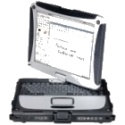 EmperorLinux Wasp Rugged Linux (Panasonic Toughbook CF-19) — Sep. 25, 2009 — Offered by Panasonic as the Windows-only Toughbook CF-19, this rugged, MIL-spec rated netbook has been refitted for Linux by reseller EmperorLinux. The 5-lbs “Wasp Rugged Linux” offers shock-mounted drives and moisture resistance, a 1.2GHz Intel Core 2 Duo CPU, a 10.4-inch XGA touchscreen with digitizer support and a swivel-mounted convertible design, plus a 160GB HDD, gigabit Ethernet, 802.11n WiFi, and Bluetooth.
EmperorLinux Wasp Rugged Linux (Panasonic Toughbook CF-19) — Sep. 25, 2009 — Offered by Panasonic as the Windows-only Toughbook CF-19, this rugged, MIL-spec rated netbook has been refitted for Linux by reseller EmperorLinux. The 5-lbs “Wasp Rugged Linux” offers shock-mounted drives and moisture resistance, a 1.2GHz Intel Core 2 Duo CPU, a 10.4-inch XGA touchscreen with digitizer support and a swivel-mounted convertible design, plus a 160GB HDD, gigabit Ethernet, 802.11n WiFi, and Bluetooth.
 System76 Starling — Aug. 18, 2009 — This Ubuntu-based netbook from Denver-based systems integrator System76 ships with a 10-inch display and the usual Intel Atom N270 CPU. The 2.6 pound Starling also offers a 160GB hard disk drive, WiFi, Ethernet, and a six-cell battery.
System76 Starling — Aug. 18, 2009 — This Ubuntu-based netbook from Denver-based systems integrator System76 ships with a 10-inch display and the usual Intel Atom N270 CPU. The 2.6 pound Starling also offers a 160GB hard disk drive, WiFi, Ethernet, and a six-cell battery.
 ZaReason Terra A20 — Aug. 14, 2009 — Berkeley, Calif.-based system integrator ZaReason offers Ubuntu Linux with this mocha-colored netbook. The Terra A20 includes an Intel Atom N270 CPU, a 10-inch display, a 160GB hard disk drive, and an optional internal cellular modem.
ZaReason Terra A20 — Aug. 14, 2009 — Berkeley, Calif.-based system integrator ZaReason offers Ubuntu Linux with this mocha-colored netbook. The Terra A20 includes an Intel Atom N270 CPU, a 10-inch display, a 160GB hard disk drive, and an optional internal cellular modem.
 Gigabyte T1028X/G — Aug. 11, 2009 — Gigabyte's T1028X/G offers a swiveling touchscreen and an Intel Atom N280 processor. The netbook has a 10-inch, 1366 x 768 pixel display, an ExpressCard slot, a HSDPA 3G modem, Bluetooth 2.1, 802.11b/g/n, and optional WiMAX.
Gigabyte T1028X/G — Aug. 11, 2009 — Gigabyte's T1028X/G offers a swiveling touchscreen and an Intel Atom N280 processor. The netbook has a 10-inch, 1366 x 768 pixel display, an ExpressCard slot, a HSDPA 3G modem, Bluetooth 2.1, 802.11b/g/n, and optional WiMAX.
 Point of View Mobii Ion — Jul. 23, 2009 — The “Mobii Ion” netbook comes from Netherlands-based Point of View, and includes Nvidia's Ion companion chip along with Intel's Atom 230 CPU. The netbook offers a 10-inch screen, HDMI output, a 160GB hard disk drive, 802.11b/g WiFi, and a choice of three- or six-cell batteries.
Point of View Mobii Ion — Jul. 23, 2009 — The “Mobii Ion” netbook comes from Netherlands-based Point of View, and includes Nvidia's Ion companion chip along with Intel's Atom 230 CPU. The netbook offers a 10-inch screen, HDMI output, a 160GB hard disk drive, 802.11b/g WiFi, and a choice of three- or six-cell batteries.
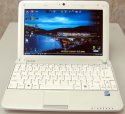 Hacao Netbook — Jul. 21, 2009 — Vietnamese Linux technology firm Hacao's netbook is accompanied by a new bilingual (English/Vietnamese) release of its Hacao Linux 2009 CE distro. The Hacao Netbook is a rebranded version of MSI's Intel Atom-based Wind, featuring a 10-inch screen and 160GB of storage.
Hacao Netbook — Jul. 21, 2009 — Vietnamese Linux technology firm Hacao's netbook is accompanied by a new bilingual (English/Vietnamese) release of its Hacao Linux 2009 CE distro. The Hacao Netbook is a rebranded version of MSI's Intel Atom-based Wind, featuring a 10-inch screen and 160GB of storage.
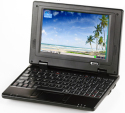 Datawind UbiSurfer — Jul. 10, 2009 — Running on an undisclosed ARM processor with a modest 128MB of RAM, the Datawind's Linux-ready UbiSurfer netbook ships with a 7-inch display and a 1GB SSD (solid state disk). Expansion for the UbiSurfer is available via an SD card slot and three USB ports, and the company offers 50GB of online storage, as well as free GPRS-based Internet access in the U.K.
Datawind UbiSurfer — Jul. 10, 2009 — Running on an undisclosed ARM processor with a modest 128MB of RAM, the Datawind's Linux-ready UbiSurfer netbook ships with a 7-inch display and a 1GB SSD (solid state disk). Expansion for the UbiSurfer is available via an SD card slot and three USB ports, and the company offers 50GB of online storage, as well as free GPRS-based Internet access in the U.K.
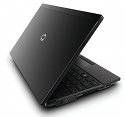 HP Mini 5101 — Jun. 24, 2009 — Available with SUSE Linux Enterprise 11, This business-oriented netbook from HP is based on Intel's Atom N280 processor. The “HP Mini 5101” includes a “95 percent” keyboard, 1366 x 768 display, hard- or solid-state disk (SSD) storage, and optional mobile broadband module.
HP Mini 5101 — Jun. 24, 2009 — Available with SUSE Linux Enterprise 11, This business-oriented netbook from HP is based on Intel's Atom N280 processor. The “HP Mini 5101” includes a “95 percent” keyboard, 1366 x 768 display, hard- or solid-state disk (SSD) storage, and optional mobile broadband module.
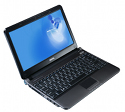 BenQ Joybook Lite U121 Eco — Jun. 8, 2009 — BenQ's netbook boasts an 11.6-inch display, optional HSPA, “eight hour” battery, and a (relatively speaking) capacious 500GB hard disk drive. The Linux-ready “Joybook Lite U121 Eco” uses Intel's original Z5xx-series Atom CPU.
BenQ Joybook Lite U121 Eco — Jun. 8, 2009 — BenQ's netbook boasts an 11.6-inch display, optional HSPA, “eight hour” battery, and a (relatively speaking) capacious 500GB hard disk drive. The Linux-ready “Joybook Lite U121 Eco” uses Intel's original Z5xx-series Atom CPU.
 HP Mini 110 with Mi — May 27, 2009 — HP's Mini 110 netbook ships with HP's own Ubuntu-based “Mi” Linux distro. The “HP Mini 110 with Mi” improves on the earlier Mini 1000 with a larger, faster hard drive, a VGA port, a third USB port and a lower $280 price.
HP Mini 110 with Mi — May 27, 2009 — HP's Mini 110 netbook ships with HP's own Ubuntu-based “Mi” Linux distro. The “HP Mini 110 with Mi” improves on the earlier Mini 1000 with a larger, faster hard drive, a VGA port, a third USB port and a lower $280 price.
iUnika Gyy — May 22, 2009 — Designed by iUnika in Spain, and built in China, this mini-netbook offers open source Linux software and a solar power option. The under-$200 “Gyy” is based on a MIPS-based Ingenic processor clocked to 400MHz, offers an 8-inch, 800 x 480 display, and is made of biodegradable materials.
 Dell Latitude 2100 — May 19, 2009 — Dell's Latitude 2100 netbook is aimed at the K-12 educational market, offering a rubberized case and an optional touchscreen. Incorporating an Intel Atom N270 with 1GB RAM, the Latitude 2100 is equipped with a 10.1-inch display, WiFi, gigabit Ethernet, up to 250GB storage, and Ubuntu Linux.
Dell Latitude 2100 — May 19, 2009 — Dell's Latitude 2100 netbook is aimed at the K-12 educational market, offering a rubberized case and an optional touchscreen. Incorporating an Intel Atom N270 with 1GB RAM, the Latitude 2100 is equipped with a 10.1-inch display, WiFi, gigabit Ethernet, up to 250GB storage, and Ubuntu Linux.
 Trinity Audio Indamixx Netbook Model 2 — May 15, 2009 — Trinity Audio Group's netbook version of its Linux-based multi-track recording product is based on an Intel Atom-based MSI Wind. The Indamixx Netbook Model 2 offers a 10-inch screen, a 3G cellular modem, and a 160GB hard drive, pre-installed with Trinity Audio's digital mixing and editing suite.
Trinity Audio Indamixx Netbook Model 2 — May 15, 2009 — Trinity Audio Group's netbook version of its Linux-based multi-track recording product is based on an Intel Atom-based MSI Wind. The Indamixx Netbook Model 2 offers a 10-inch screen, a 3G cellular modem, and a 160GB hard drive, pre-installed with Trinity Audio's digital mixing and editing suite.
 Dell Inspiron Mini 10v — May 12, 2009 — This lower-cost version of Dell's popular Mini 10 netbook runs Ubuntu Linux. The Dell Inspiron Mini 10v offers a 1.6GHz Intel Atom N270, 10-inch display, 120GB or 160GB hard drive, and a 1.3 megapixel webcam.
Dell Inspiron Mini 10v — May 12, 2009 — This lower-cost version of Dell's popular Mini 10 netbook runs Ubuntu Linux. The Dell Inspiron Mini 10v offers a 1.6GHz Intel Atom N270, 10-inch display, 120GB or 160GB hard drive, and a 1.3 megapixel webcam.
 NorhTec Gecko EduBook — May 12, 2009 — NorhTec's cut-rate netbook operates on eight AA batteries, has an internal power supply, and runs Linux on a 1GHz x86-based SoC. The “Gecko EduBook” has an 8.9-inch display and an easily reconfigurable modular design, and was expected to cost under $200.
NorhTec Gecko EduBook — May 12, 2009 — NorhTec's cut-rate netbook operates on eight AA batteries, has an internal power supply, and runs Linux on a 1GHz x86-based SoC. The “Gecko EduBook” has an 8.9-inch display and an easily reconfigurable modular design, and was expected to cost under $200.
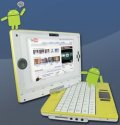 Skytone Alpha 680 — Apr. 21, 2009 — Skytone's Alpha 680 may well be the first Android-based netbook. Built around a 533MHz Freescale i.MX31 SoC, the Alpha 680 offers a 7-inch touchscreen, Ethernet, WiFi, a three-megapixel camera, and optional 3G connectivity.
Skytone Alpha 680 — Apr. 21, 2009 — Skytone's Alpha 680 may well be the first Android-based netbook. Built around a 533MHz Freescale i.MX31 SoC, the Alpha 680 offers a 7-inch touchscreen, Ethernet, WiFi, a three-megapixel camera, and optional 3G connectivity.
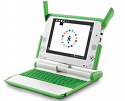 OLPC XO-1.5 — Apr. 21, 2009 — One Laptop Per Child (OLPC)'s “1.5” refresh of its Linux compatible XO-1 mini-laptop for schoolchildren in developing nations switches to a Via C7M processor. The XO-1.5 also increases memory to 1GB of DDR2 RAM, and includes 4GB or 8GB of flash.
OLPC XO-1.5 — Apr. 21, 2009 — One Laptop Per Child (OLPC)'s “1.5” refresh of its Linux compatible XO-1 mini-laptop for schoolchildren in developing nations switches to a Via C7M processor. The XO-1.5 also increases memory to 1GB of DDR2 RAM, and includes 4GB or 8GB of flash.
 MSI Wind U123 — Apr. 13, 2009 — This MSI netbook uses Intel's 1.66GHz Atom N280 processor and offers an optional TV tuner. The “Wind U123” has a 10-inch display, 80GB, 120GB, or 160GB hard disk drives, “EasyFace” security software, and available HSDPA (high speed downlink packet access) networking.
MSI Wind U123 — Apr. 13, 2009 — This MSI netbook uses Intel's 1.66GHz Atom N280 processor and offers an optional TV tuner. The “Wind U123” has a 10-inch display, 80GB, 120GB, or 160GB hard disk drives, “EasyFace” security software, and available HSDPA (high speed downlink packet access) networking.
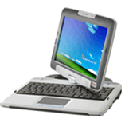 Hanvon HCQ890 (Intel Classmate PC Convertible) — Apr. 10, 2009 — This updated version of Intel's convertible “Classmate” PC for schoolchildren is targeted at the Chinese market. The Hanvon HCQ890 sports a 1.6GHz Intel N270, an 8.9-inch, 1024 x 600 display, a 1.3-megapixel camera, WiFi, Ethernet, and other I/O, and provides Chinese-language software, including a handwriting-recognition program that lets students “write naturally by resting their palm on the touchscreen.”
Hanvon HCQ890 (Intel Classmate PC Convertible) — Apr. 10, 2009 — This updated version of Intel's convertible “Classmate” PC for schoolchildren is targeted at the Chinese market. The Hanvon HCQ890 sports a 1.6GHz Intel N270, an 8.9-inch, 1024 x 600 display, a 1.3-megapixel camera, WiFi, Ethernet, and other I/O, and provides Chinese-language software, including a handwriting-recognition program that lets students “write naturally by resting their palm on the touchscreen.”
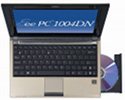 Asus Eee PC 1004DN — Apr. 01, 2009 — This Asus Eee PC variant includes an integral optical disk drive. The Eee PC 1004DN is equipped with an Intel Atom N280, a 10-inch display, a 120GB hard drive, up to 2GB of RAM, and weighs 3.19 pounds with a six-cell battery.
Asus Eee PC 1004DN — Apr. 01, 2009 — This Asus Eee PC variant includes an integral optical disk drive. The Eee PC 1004DN is equipped with an Intel Atom N280, a 10-inch display, a 120GB hard drive, up to 2GB of RAM, and weighs 3.19 pounds with a six-cell battery.
 Samsung N110, N120, and NC310 — Mar. 26, 2009 — These three Samsung netbooks offer 102-inch displays and Intel Atom processors. The N110, N120 (left), and NC310 offer slightly different form factors, but appear to have improved keyboards, six-cell batteries, and 160GB hard drives.
Samsung N110, N120, and NC310 — Mar. 26, 2009 — These three Samsung netbooks offer 102-inch displays and Intel Atom processors. The N110, N120 (left), and NC310 offer slightly different form factors, but appear to have improved keyboards, six-cell batteries, and 160GB hard drives.
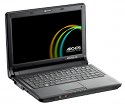 Archos 10 — Mar. 24, 2009 — Archos's first netbook is based on a Linux-compatible Hasee design, but is currently offered only with Windows XP. The “Archos 10” has a 1.6GHz Intel Atom N270 processor, 160GB hard drive, a 10.2-inch display, WiFi, and 1GB of RAM.
Archos 10 — Mar. 24, 2009 — Archos's first netbook is based on a Linux-compatible Hasee design, but is currently offered only with Windows XP. The “Archos 10” has a 1.6GHz Intel Atom N270 processor, 160GB hard drive, a 10.2-inch display, WiFi, and 1GB of RAM.
 Top Crown 3G Netbook — Mar. 19, 2009 — Despite the logo, this is not a new version of the Macbook, but a Linux-compatible netbook from China-based Top Crown Technology that uses Via's 64-bit Nano processor and VX855 northbridge/southbridge. The “3G Netbook” includes a 10.1-inch display, HDD or SSD storage, WiFi, Bluetooth, and HSDPA 3G cellular connectivity.
Top Crown 3G Netbook — Mar. 19, 2009 — Despite the logo, this is not a new version of the Macbook, but a Linux-compatible netbook from China-based Top Crown Technology that uses Via's 64-bit Nano processor and VX855 northbridge/southbridge. The “3G Netbook” includes a 10.1-inch display, HDD or SSD storage, WiFi, Bluetooth, and HSDPA 3G cellular connectivity.
 Asus Eee PC 1008HA — Mar. 05, 2009 — The second Asus netbook that uses Intel's 1.66GHz Atom N280 processor, the “Eee PC 1008HA” is just an inch thick, and weighs 2.4 pounds. The Eee PC 1008HA offers a 10-inch LED-backlit display and 160GB hard disk drive, and is said to deliver five-hour battery life.
Asus Eee PC 1008HA — Mar. 05, 2009 — The second Asus netbook that uses Intel's 1.66GHz Atom N280 processor, the “Eee PC 1008HA” is just an inch thick, and weighs 2.4 pounds. The Eee PC 1008HA offers a 10-inch LED-backlit display and 160GB hard disk drive, and is said to deliver five-hour battery life.
 Always Innovating Touch Book — Mar. 02, 2009 — This open-source Linux netbook from Always Innovating may be the first true ARM-based netbook. The Touch Book offers a detachable 8.9-inch touchscreen that can act as a standalone tablet, boasts 10-15 hour battery life, weighs less than two pounds, offers WiFi 80211.b/g/n, and uses the Texas Instruments ARM Cortex-A8- and OMAP3-based BeagleBoard design.
Always Innovating Touch Book — Mar. 02, 2009 — This open-source Linux netbook from Always Innovating may be the first true ARM-based netbook. The Touch Book offers a detachable 8.9-inch touchscreen that can act as a standalone tablet, boasts 10-15 hour battery life, weighs less than two pounds, offers WiFi 80211.b/g/n, and uses the Texas Instruments ARM Cortex-A8- and OMAP3-based BeagleBoard design.
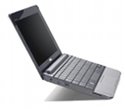 Dell Inspiron Mini 10 — Feb. 20, 2009 — Dell's second Linux-compatible netbook offers an Ubuntu 8.04 install, a 10-inch display, and an HDMI (high definition multimedia interface) output. The Inspiron Mini 10 includes a 1.3GHz Intel Atom Z520 or 1.6GHz Atom Z530 processor, 1.3-megapixel webcam, Bluetooth, and an optional, integrated ATSC tuner.
Dell Inspiron Mini 10 — Feb. 20, 2009 — Dell's second Linux-compatible netbook offers an Ubuntu 8.04 install, a 10-inch display, and an HDMI (high definition multimedia interface) output. The Inspiron Mini 10 includes a 1.3GHz Intel Atom Z520 or 1.6GHz Atom Z530 processor, 1.3-megapixel webcam, Bluetooth, and an optional, integrated ATSC tuner.
 HP Mini 1000 with MIE — Oct. 29, 2008 — This HP netbook ships with a proprietary, media-centric Linux distribution called MIE (Mobile Internet Experience). The HP Mini 1000 with MIE features an 8.9-inch or 10.2-inch display, a 1.6GHz Atom N270 processor, plus a 60GB hard drive or SSD (solid state disk) up to 16GB, says HP.
HP Mini 1000 with MIE — Oct. 29, 2008 — This HP netbook ships with a proprietary, media-centric Linux distribution called MIE (Mobile Internet Experience). The HP Mini 1000 with MIE features an 8.9-inch or 10.2-inch display, a 1.6GHz Atom N270 processor, plus a 60GB hard drive or SSD (solid state disk) up to 16GB, says HP.
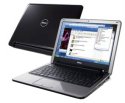 Dell Inspiron Mini 12 — Oct. 28, 2008 — Dell's latest Linux-compatible netbook breaks from the herd by offering a large 12-inch display and using an Intel Z5xx Atom CPU instead of the Atom N270 used in its earlier Inspiron Mini 9. The Inspiron Mini 12 includes a 60/80GB hard drive, 1GB of RAM, webcam, Bluetooth, and 802.11b/g WiFi, and runs Ubuntu Linux.
Dell Inspiron Mini 12 — Oct. 28, 2008 — Dell's latest Linux-compatible netbook breaks from the herd by offering a large 12-inch display and using an Intel Z5xx Atom CPU instead of the Atom N270 used in its earlier Inspiron Mini 9. The Inspiron Mini 12 includes a 60/80GB hard drive, 1GB of RAM, webcam, Bluetooth, and 802.11b/g WiFi, and runs Ubuntu Linux.
 Lemote Tech Yeeloong — Oct. 22, 2008 — This high-efficiency “netbook” from China-based Lemote Tech boasts a TDP of just 12 Watts. Sporting an 8.9-inch display and a 600-800MHz Loongson 2F processor, the “Yeeloong” (translation: portable dragon) runs Debian Linux.
Lemote Tech Yeeloong — Oct. 22, 2008 — This high-efficiency “netbook” from China-based Lemote Tech boasts a TDP of just 12 Watts. Sporting an 8.9-inch display and a 600-800MHz Loongson 2F processor, the “Yeeloong” (translation: portable dragon) runs Debian Linux.
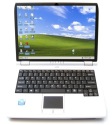 Eltrinex MobilePC — Sep. 18, 2008 — The “MobilePC” is offered by Czech vendor Eltrinex with either Linux or Windows XP Home Edition, and sports a 320GB hard drive. The MobilePC is equipped with a a Via C7-M ULV processor, and offers a 10.2-inch display, 1GB of RAM, 802.11a/b/g WiFi, and a bundled external DVD writer.
Eltrinex MobilePC — Sep. 18, 2008 — The “MobilePC” is offered by Czech vendor Eltrinex with either Linux or Windows XP Home Edition, and sports a 320GB hard drive. The MobilePC is equipped with a a Via C7-M ULV processor, and offers a 10.2-inch display, 1GB of RAM, 802.11a/b/g WiFi, and a bundled external DVD writer.
 OLPC XO-2 — Sep. 05, 2008 — One Laptop Per Child (OLPC) has demonstrated an early mock-up of an intriguing follow-on to its XO-1 laptop. Like the XO-1, the XO-2 is based on Linux and aimed at kids in developing countries, but it's smaller, and instead of a keyboard it offers dual 16×9-proportioned, sunlight-readable touchscreens, one of which can be used as a virtual keyboard.
OLPC XO-2 — Sep. 05, 2008 — One Laptop Per Child (OLPC) has demonstrated an early mock-up of an intriguing follow-on to its XO-1 laptop. Like the XO-1, the XO-2 is based on Linux and aimed at kids in developing countries, but it's smaller, and instead of a keyboard it offers dual 16×9-proportioned, sunlight-readable touchscreens, one of which can be used as a virtual keyboard.
 HiVision miniNote — Sep. 04, 2008 — China-based HiVision's miniNote is scheduled to sell at volume for only $98. The MIPS-based miniNote offers a 128MB of RAM, 1GB of flash, expandable via an SD card slot, built-in WiFi and Ethernet, three USB ports, and audio I/O.
HiVision miniNote — Sep. 04, 2008 — China-based HiVision's miniNote is scheduled to sell at volume for only $98. The MIPS-based miniNote offers a 128MB of RAM, 1GB of flash, expandable via an SD card slot, built-in WiFi and Ethernet, three USB ports, and audio I/O.
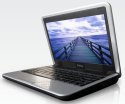 Del Inspiron Mini 9 — Sep. 04, 2008 — Dell's first netbook is based on a 1.6GHz Intel Atom N270, and is loaded with Ubuntu Linux 8.04. The Inspiron Mini 9 offers up to 1GB SDRAM, an 8.9-inch, 1024 x 600 display, three USB ports, Ethernet, a 4GB to 16GB solid-state drive, and 2GB of free online storage.
Del Inspiron Mini 9 — Sep. 04, 2008 — Dell's first netbook is based on a 1.6GHz Intel Atom N270, and is loaded with Ubuntu Linux 8.04. The Inspiron Mini 9 offers up to 1GB SDRAM, an 8.9-inch, 1024 x 600 display, three USB ports, Ethernet, a 4GB to 16GB solid-state drive, and 2GB of free online storage.
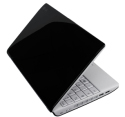 LG X110 — Aug. 29, 2008 — This LG Electronics netbook features a 1.6GHz Atom N270 and a built-in HSPA (high speed packet access) cellular modem. The X110 has a 10-inch, 1024 x 600 display, 1GB RAM, an 80GB or 120GB hard drive, 802.11b/g, and an Ethernet port.
LG X110 — Aug. 29, 2008 — This LG Electronics netbook features a 1.6GHz Atom N270 and a built-in HSPA (high speed packet access) cellular modem. The X110 has a 10-inch, 1024 x 600 display, 1GB RAM, an 80GB or 120GB hard drive, 802.11b/g, and an Ethernet port.
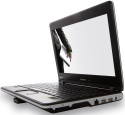 Emtec Gdium — Aug. 18, 2008 — Emtec's Gdium is aimed at the educational and consumer markets, and boots Mandriva Linux from removable USB flash keys. Equipped with a MIPS64-based 900MHz Loongson-2F processor, 512MB RAM, and 8-16GB of flash, the 2.4-pound, WiFi-enabled Gdium offers a generous 10-inch, 1024×600 display.
Emtec Gdium — Aug. 18, 2008 — Emtec's Gdium is aimed at the educational and consumer markets, and boots Mandriva Linux from removable USB flash keys. Equipped with a MIPS64-based 900MHz Loongson-2F processor, 512MB RAM, and 8-16GB of flash, the 2.4-pound, WiFi-enabled Gdium offers a generous 10-inch, 1024×600 display.
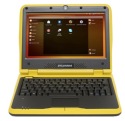 Sylvania g netbook MESO — Aug. 08, 2008 — Developed by Digital Gadgets and sold under the Sylvania brand name, the “g netbook MESO” is based on an Intel 1.6GHz Atom processor. The WiFi-enabled netbook is equipped with an 8.9-inch display, comes in four colors, and includes an 80GB hard drive, four-cell battery, and a webcam.
Sylvania g netbook MESO — Aug. 08, 2008 — Developed by Digital Gadgets and sold under the Sylvania brand name, the “g netbook MESO” is based on an Intel 1.6GHz Atom processor. The WiFi-enabled netbook is equipped with an 8.9-inch display, comes in four colors, and includes an 80GB hard drive, four-cell battery, and a webcam.
 One A440, A110, A115, and A140 — Aug. 06, 2008 — Germany-based retailer One offers four branded, Linux-based netbooks that consume only 3.5 Watts apiece. The One A440, A110, A115, and A140 are all based on the Via C7-M Ultra Low Voltage processor (ULV), and come with integrated Via graphics chips.
One A440, A110, A115, and A140 — Aug. 06, 2008 — Germany-based retailer One offers four branded, Linux-based netbooks that consume only 3.5 Watts apiece. The One A440, A110, A115, and A140 are all based on the Via C7-M Ultra Low Voltage processor (ULV), and come with integrated Via graphics chips.
 Lenovo IdeaPad S9 — Aug. 05, 2008 — Lenovo's IdeaPad S9 is based on a 1.6GHz Intel Atom N270 processor and runs Linpus Linux. The netbook features 4GB of solid-state storage, an 8.9-inch display, a 1.3-megapixel webcam, Ethernet, WiFi, and an optional Bluetooth connection.
Lenovo IdeaPad S9 — Aug. 05, 2008 — Lenovo's IdeaPad S9 is based on a 1.6GHz Intel Atom N270 processor and runs Linpus Linux. The netbook features 4GB of solid-state storage, an 8.9-inch display, a 1.3-megapixel webcam, Ethernet, WiFi, and an optional Bluetooth connection.
 Asus Eee PC 901 and 1000 — Jun. 04, 2008 — These Intel Atom-based versions of the Asus Eee PC processors add Bluetooth, WiMAX options, longer battery life, improved shock resistance, faster WiFi, and greater storage to the previous netbook designs. The Eee PC 901 and 1000 models provide 8.9-inch and 10-inch displays, respectively, and clock to 1.6GHz.
Asus Eee PC 901 and 1000 — Jun. 04, 2008 — These Intel Atom-based versions of the Asus Eee PC processors add Bluetooth, WiMAX options, longer battery life, improved shock resistance, faster WiFi, and greater storage to the previous netbook designs. The Eee PC 901 and 1000 models provide 8.9-inch and 10-inch displays, respectively, and clock to 1.6GHz.
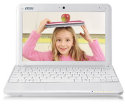 MSI Wind NB U100 — Jun. 04, 2008 — The MSI's Intel Atom-based “Wind NB U100” netbook includes a 10-inch display, 80GB hard drive, 1GB of RAM, webcam, five-hour battery life, 802.11b/g, and Bluetooth wireless. The Wind NB U100's N270 Atom processor can be overclocked to 1.9GHz.
MSI Wind NB U100 — Jun. 04, 2008 — The MSI's Intel Atom-based “Wind NB U100” netbook includes a 10-inch display, 80GB hard drive, 1GB of RAM, webcam, five-hour battery life, 802.11b/g, and Bluetooth wireless. The Wind NB U100's N270 Atom processor can be overclocked to 1.9GHz.
 3K RazorBook 400-Mini-Notebook — Jun. 04, 2008 — 3K Computer's $300 ultra-mini PC notebook weighs under two pounds and runs the Windows-like “Genuine CE” Linux distribution from a 4GB SSD (solid-state disk). The RazorBook 400-Mini-Notebook uses a 32-bit RISC-based processor from Chinese processor start-up Ingenic.
3K RazorBook 400-Mini-Notebook — Jun. 04, 2008 — 3K Computer's $300 ultra-mini PC notebook weighs under two pounds and runs the Windows-like “Genuine CE” Linux distribution from a 4GB SSD (solid-state disk). The RazorBook 400-Mini-Notebook uses a 32-bit RISC-based processor from Chinese processor start-up Ingenic.
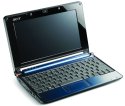 Acer Aspire One — Jun. 03, 2008 — Acer's Aspire One “netbook” is based on a 1.6GHz Intel Centrino Atom processor and Linpus Linux. The $380 mini-notebook offers 512MB or 1GB of RAM, 8GB flash, an 8.9-inch, 1024×600 display, WiFi, webcam, and an optional 80GB hard drive.
Acer Aspire One — Jun. 03, 2008 — Acer's Aspire One “netbook” is based on a 1.6GHz Intel Centrino Atom processor and Linpus Linux. The $380 mini-notebook offers 512MB or 1GB of RAM, 8GB flash, an 8.9-inch, 1024×600 display, WiFi, webcam, and an optional 80GB hard drive.
 Via OpenBook — May 27, 2008 — This Via Technologies miniature notebook reference design boasts an 8.9-inch screen, interchangeable local and wide area networking modules, and a “dual-headed” video camera. The Via “OpenBook” also features an open source case design that users can download in CAD (computer-aided design) file format.
Via OpenBook — May 27, 2008 — This Via Technologies miniature notebook reference design boasts an 8.9-inch screen, interchangeable local and wide area networking modules, and a “dual-headed” video camera. The Via “OpenBook” also features an open source case design that users can download in CAD (computer-aided design) file format.
 Elonex One — May 27, 2008 — This sub-$200 Linux-based mini-laptop from Elonex is aimed at the British educational market. Based on a 300MHz processor, the Elonex One includes WiFi, Ethernet, Flash storage, USB, and a 7-inch, 800 x 480 detachable touch display.
Elonex One — May 27, 2008 — This sub-$200 Linux-based mini-laptop from Elonex is aimed at the British educational market. Based on a 300MHz processor, the Elonex One includes WiFi, Ethernet, Flash storage, USB, and a 7-inch, 800 x 480 detachable touch display.
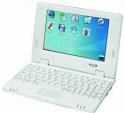 Bestlink Alpha 400 — May 20, 2008 — Bestlink's ultra-mini PC (UMPC) laptop costs only $250 ($180 in volume). Based on a 400MHz XBurst CPU from Ingenic, the Alpha 400 offers a 7-inch, truecolor display, 128MB RAM, 1-2GB of internal flash, and a USB-attached hard drive with up to 160GB. In the UK, Maplin is offering an almost identical version of the Alpha 400 called the Maplin minibook.
Bestlink Alpha 400 — May 20, 2008 — Bestlink's ultra-mini PC (UMPC) laptop costs only $250 ($180 in volume). Based on a 400MHz XBurst CPU from Ingenic, the Alpha 400 offers a 7-inch, truecolor display, 128MB RAM, 1-2GB of internal flash, and a USB-attached hard drive with up to 160GB. In the UK, Maplin is offering an almost identical version of the Alpha 400 called the Maplin minibook.
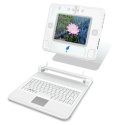 InkMedia Ink MC — Apr. 17, 2008 — This under-$300 notebook from British Columbia-based InkMedia is targeted primarily at students in both the developing and developed markets. Based on a Via chip, the Ink Mobile Computer (Ink MC) depends on flash-based storage and offers an 8.6-inch SVGA display, four USB slots, Ethernet, and WiFi.
InkMedia Ink MC — Apr. 17, 2008 — This under-$300 notebook from British Columbia-based InkMedia is targeted primarily at students in both the developing and developed markets. Based on a Via chip, the Ink Mobile Computer (Ink MC) depends on flash-based storage and offers an 8.6-inch SVGA display, four USB slots, Ethernet, and WiFi.
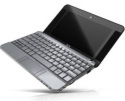 HP 2133 Mini-Note PC — May 20, 2008 — HP's Linux-compatible mini-laptop weighs 2.8 pounds and targets education and cost-conscious consumers. The HP 2133 Mini-Note PC is based on a Via C7-M ULV processor, and offers a nine-inch display and a nearly full-sized keyboard.
HP 2133 Mini-Note PC — May 20, 2008 — HP's Linux-compatible mini-laptop weighs 2.8 pounds and targets education and cost-conscious consumers. The HP 2133 Mini-Note PC is based on a Via C7-M ULV processor, and offers a nine-inch display and a nearly full-sized keyboard.
 VDL Designs Jisus — Apr. 08, 2008 — Marketed by Dutch integrator Van Der Led (VDL) Designs, the “Jisus” is similar in specs to the original Asus Eee PC. The WiFi-enabled ultra-mobile PC is equipped with a Chinese-made 1GHz Loongson CPU, has an 8.9-inch display, and runs Ubuntu Linux.
VDL Designs Jisus — Apr. 08, 2008 — Marketed by Dutch integrator Van Der Led (VDL) Designs, the “Jisus” is similar in specs to the original Asus Eee PC. The WiFi-enabled ultra-mobile PC is equipped with a Chinese-made 1GHz Loongson CPU, has an 8.9-inch display, and runs Ubuntu Linux.
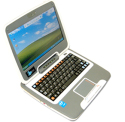 Intel Classmate — Apr. 03, 2008 — The latest version of Intel's Classmate mini-laptop reference design now targets consumers, as well as schoolchildren in the developing world. Based on a 900MHz Celeron ULV processor, the new Classmate offers a 1GB SSD (solid-state drive), a 30GB hard drive, a revised touchpad and keyboard, a webcam, and a nine-inch screen.
Intel Classmate — Apr. 03, 2008 — The latest version of Intel's Classmate mini-laptop reference design now targets consumers, as well as schoolchildren in the developing world. Based on a 900MHz Celeron ULV processor, the new Classmate offers a 1GB SSD (solid-state drive), a 30GB hard drive, a revised touchpad and keyboard, a webcam, and a nine-inch screen.
 Everex CloudBook Max — Apr. 01, 2008 — The successor to the Everex Cloudbook, the “CloudBook Max” features a mobile WiMAX radio chip supplied by GCT Semiconductor, and will work with Sprint's high-speed XOHMwireless network. The Cloudbook Max is based on Via's single-chip VX800 chipset, and offers a 8.9-inch screen, WiFi, Bluetooth, GPS, webcam, and an 80GB hard drive.
Everex CloudBook Max — Apr. 01, 2008 — The successor to the Everex Cloudbook, the “CloudBook Max” features a mobile WiMAX radio chip supplied by GCT Semiconductor, and will work with Sprint's high-speed XOHMwireless network. The Cloudbook Max is based on Via's single-chip VX800 chipset, and offers a 8.9-inch screen, WiFi, Bluetooth, GPS, webcam, and an 80GB hard drive.
 Norhtec Gecko Laptop — Mar. 07, 2008 — This sub-$300 ultra-mini PC (UMPC) laptop from Thai systems integrator Norhtec is based on a Quanta design. Aimed at the developing-country market, the “Gecko Laptop” is being built by Quanta and runs Linpus Linux Lite, a distribution designed for small-screen mini-PCs.
Norhtec Gecko Laptop — Mar. 07, 2008 — This sub-$300 ultra-mini PC (UMPC) laptop from Thai systems integrator Norhtec is based on a Quanta design. Aimed at the developing-country market, the “Gecko Laptop” is being built by Quanta and runs Linpus Linux Lite, a distribution designed for small-screen mini-PCs.
 Everex CloudBook Ultra-Mobile PC — Jan. 10, 2008 — The Everex CloudBook Ultra-Mobile PC runs the gOS 2.0 Linux distro, and is equipped with a Via C7-M ULV processor clocked at 1.2GHz. The two-pound laptop ships with 512MB RAM, a 4-in-1 memory card reader, 30GB hard drive, and WiFi, and features a 7-inch, 800×480-pixel screen.
Everex CloudBook Ultra-Mobile PC — Jan. 10, 2008 — The Everex CloudBook Ultra-Mobile PC runs the gOS 2.0 Linux distro, and is equipped with a Via C7-M ULV processor clocked at 1.2GHz. The two-pound laptop ships with 512MB RAM, a 4-in-1 memory card reader, 30GB hard drive, and WiFi, and features a 7-inch, 800×480-pixel screen.
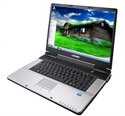 Zonbu Notebook (Zonbook 1) — Nov. 28, 2007 — Zonbu's Zonbu Notebook or “Zonbook 1” is based on a power-efficient, 1.5GHz Via C7-M processor, runs Gentoo Linux and 20 open source applications, and sells for $280 with a managed service plan. The 14.1 x 10.7 x 1.5-inch Zonbook is equipped with 512MB RAM, a 5.4-inch WXGA (1440×900) display, a 60GB hard drive, WiFi, and a DVD-RW/CD-RW drive.
Zonbu Notebook (Zonbook 1) — Nov. 28, 2007 — Zonbu's Zonbu Notebook or “Zonbook 1” is based on a power-efficient, 1.5GHz Via C7-M processor, runs Gentoo Linux and 20 open source applications, and sells for $280 with a managed service plan. The 14.1 x 10.7 x 1.5-inch Zonbook is equipped with 512MB RAM, a 5.4-inch WXGA (1440×900) display, a 60GB hard drive, WiFi, and a DVD-RW/CD-RW drive.
 Asus Eee PC 4G — Nov. 01, 2007 — This Xandros Linux-powered “ultra-mobile PC” (UMPC) from Asus is equipped with a 900MHz Intel “Dothan” Celeron M CPU and 512MB RAM. Named for its 4GB SSD (solid state drive), the Asus Eee PC 4G offers a 7-inch display driven by an Intel Graphics Media Accelerator 900 GM chipset, offering 800×480 resolution.
Asus Eee PC 4G — Nov. 01, 2007 — This Xandros Linux-powered “ultra-mobile PC” (UMPC) from Asus is equipped with a 900MHz Intel “Dothan” Celeron M CPU and 512MB RAM. Named for its 4GB SSD (solid state drive), the Asus Eee PC 4G offers a 7-inch display driven by an Intel Graphics Media Accelerator 900 GM chipset, offering 800×480 resolution.
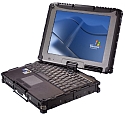 Kontron NotePAC Duo — Aug. 24, 2007 — Aimed at law-enforcement officers and other field personnel, Kontron's ruggedized convertible notebook has a resistive touchscreen display that pivots and folds flat to form a tablet. The NotePAC Duo features a fanless, magnesium case design, a 1.2GHz Core Duo processor, and either a 10.4-inch XGA (1024 x 768 pixel) display or a 12.1-inch WXGA (1280 x 800 pixel) display.
Kontron NotePAC Duo — Aug. 24, 2007 — Aimed at law-enforcement officers and other field personnel, Kontron's ruggedized convertible notebook has a resistive touchscreen display that pivots and folds flat to form a tablet. The NotePAC Duo features a fanless, magnesium case design, a 1.2GHz Core Duo processor, and either a 10.4-inch XGA (1024 x 768 pixel) display or a 12.1-inch WXGA (1280 x 800 pixel) display.
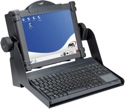 AML MT7570 — Aug. 21, 2007 — AML's sealed, metal laptop is intended for mounting in industrial vehicles, and comes standard with Debian Linux 4.0 (“Etch”). The MT7570 clocks its AMD Geode GX533 processor at 400MHz, includes 802.11b/g wireless capabilities, and has a 12.1-inch touchscreen with 800×600 resolution.
AML MT7570 — Aug. 21, 2007 — AML's sealed, metal laptop is intended for mounting in industrial vehicles, and comes standard with Debian Linux 4.0 (“Etch”). The MT7570 clocks its AMD Geode GX533 processor at 400MHz, includes 802.11b/g wireless capabilities, and has a 12.1-inch touchscreen with 800×600 resolution.
 Palm Foleo — Aug. 07, 2007 — Palm's Linux-based Foleo “mobile companion” sports a “fullsize” keyboard and a 10.2-inch color screen with 1024×600 resolution. The 2.4-pound Foleo utilizes Wind River's embedded Linux distribution.
Palm Foleo — Aug. 07, 2007 — Palm's Linux-based Foleo “mobile companion” sports a “fullsize” keyboard and a 10.2-inch color screen with 1024×600 resolution. The 2.4-pound Foleo utilizes Wind River's embedded Linux distribution.
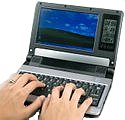 Via NanoBook Ultra Mobile Device — Jun. 05, 2007 — This Via Technologies UMPC “sub-notebook” reference design is based on Via's C7-M Ultra Mobile Platform chipset, which includes a 1.2GHz Via C7-M ULV and 1GB DDR2 SDRAM. The NanoBook Ultra Mobile Device (UMD) offers a full QWERTY keyboard, a 7-inch WVGA (840×480) touchscreen, a 30GB or 60GB hard drive, a 4-in-1 card reader, WiFi, Bluetooth, Ethernet, DVI output, and two USB 2.0 ports.
Via NanoBook Ultra Mobile Device — Jun. 05, 2007 — This Via Technologies UMPC “sub-notebook” reference design is based on Via's C7-M Ultra Mobile Platform chipset, which includes a 1.2GHz Via C7-M ULV and 1GB DDR2 SDRAM. The NanoBook Ultra Mobile Device (UMD) offers a full QWERTY keyboard, a 7-inch WVGA (840×480) touchscreen, a 30GB or 60GB hard drive, a 4-in-1 card reader, WiFi, Bluetooth, Ethernet, DVI output, and two USB 2.0 ports.
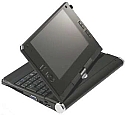 Data Evolution Corp Cathena CX — Apr. 27, 2007 — Manufactured by Data Evolution Corp (DEC), the company that aquired AMD's PIC (personal Internet computer) design, the Cathena CX ultra-mobile PC (UMPC) is based on a 500MHz AMD Geode LX800 processor. Aimed at the education market, the Cathena CX has a 7-inch swiveling WVGA (800 x 480 resolution) display and a QWERTY keyboard.
Data Evolution Corp Cathena CX — Apr. 27, 2007 — Manufactured by Data Evolution Corp (DEC), the company that aquired AMD's PIC (personal Internet computer) design, the Cathena CX ultra-mobile PC (UMPC) is based on a 500MHz AMD Geode LX800 processor. Aimed at the education market, the Cathena CX has a 7-inch swiveling WVGA (800 x 480 resolution) display and a QWERTY keyboard.
This article was originally published on LinuxDevices.com and has been donated to the open source community by QuinStreet Inc. Please visit LinuxToday.com for up-to-date news and articles about Linux and open source.